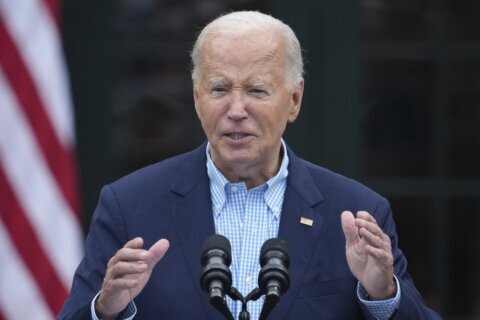As the Biden administration scrambles to coordinate the evacuations of Americans and vulnerable Afghans from Afghanistan, the next political battle is already shaping up over how expansive the US role should be in helping to resettle tens of thousands of Afghans amid new ripples of anti-immigrant sentiment from the far right.
Biden’s compassion and empathy for those in need has been a hallmark of his career — and it was one of his central appeals in the 2020 campaign. But he now finds himself constrained by the looming pressures of election year politics and the corrosive, nativist rhetoric of a former President who may well challenge him in 2024 and is already looking for any opportunity to claim that his successor did not put America first — as he did at an Alabama rally Saturday night.
Long before the fall of Kabul to the Taliban, refugee intake in the US had become a volatile political issue for the Biden administration, one complicated by the humanitarian crisis at the US-Mexico border and the opposing pressures from conservative Republicans and progressive Democrats who demanded that Biden follow through on his campaign promise to increase the US cap on refugees.
Former President Donald Trump, who rose to power often using racist rhetoric to describe immigrants, set the stage for that debate during his presidency by dramatically scaling back the number of refugees that the US was willing to accept — ultimately slashing the cap to 15,000 for the 2021 fiscal year. He then weaponized Biden’s more welcoming stance to refugees during the 2020 campaign, falsely alleging at one late September rally that Biden would turn Minnesota “into a refugee camp” and open “the flood gates to radical Islamic terrorism.” Trump, still the GOP’s most influential figure, dug into that language Saturday night alongside his endorsed candidate for the state’s 2022 Senate race, Rep. Mo Brooks.
The images of desperation from inside Afghanistan are creating complex new fault lines in that debate as US lawmakers attempt to define the scope of American responsibility for getting vulnerable Afghans out of the country and finding them a place to go. There is an emerging divide within the Republican Party — fueled in part by anti-immigrant rhetoric on Fox News and from Trump loyalists — that is certain to heat up as more Afghans are loaded onto planes seeking permanent homes in the US and other nations.
In the past week, many Republican governors and senators have spoken up about America’s obligation to assist in relocating Afghans — particularly those who helped the US war effort — including Utah Gov. Spencer Cox, Maryland Gov. Larry Hogan, Iowa Sen. Joni Ernst, Texas Sen. John Cornyn and Senate Minority Leader Mitch McConnell, who told a Kentucky TV station that “we need to care for them.” Ernst told Iowa’s KCCI 8 that she and other lawmakers are pushing to get as many at-risk Afghans out as possible “and we’d love to have them here in Iowa.” Earlier this month, GOP Utah Sen. Mitt Romney tweeted about “our Afghan friends,” calling on Biden to “urgently rush to defend, rescue, and give and expand asylum.”
But some staunch Trump loyalists — and the former President himself — have spent the past week engaging in revisionist history about their own role in Afghanistan’s crisis, including their relentless advocacy for drastic cuts to the overall number of refugees accepted by the United States — a major factor in the current visa processing backlog.
Trump’s former senior adviser Stephen Miller tweeted last week that the focus should be “on regional resettlement — not mass relocation inside the United States.” If the US is not careful, Miller warned, “all we could have to show for 20 years in Afghanistan is a failed terror state, a humanitarian catastrophe, and an immigration policy that has brought the threat of jihadism inside our shores.”
Former Trump campaign adviser Steve Cortes tweeted an image of a plane full of people leaving Afghanistan with the caption: “Raise your hand if you want this plane landing in your town?”
Trump at first seemed sympathetic to at-risk Afghans on Monday, asking why the US military was leaving before civilians “and others who have been good to our country and should be allowed to seek refuge.” But by Wednesday, he issued a statement critical of an image of Afghans leaving the country in US military aircraft: “This plane should have been full of Americans. America First!”
On Saturday night, Trump suggested that some desperate Afghans deserved to be helped by the US, but he did not articulate a clear position on how many should be relocated in the US. The former President went on to boast about how his administration “dramatically reduced refugee admissions and kept radical Islamic terrorists the hell out of our country.”
He also faulted Biden for reversing his travel ban restricting entry to the United States from predominantly Muslim countries. “Biden revoked that beautiful, wonderful travel ban and has surged refugee resettlement from the most dangerous countries in the world,” Trump said. “The most dangerous terrorists in the world, they come into our country now, with no problem. ‘Come on in, love to have you.’ This is a sick culture and our country is a disaster, and it’s going to die before your very eyes if this craziness isn’t stopped.”
Many details remain unclear
Amid questions about whether the US will expand its Special Immigrant Visa program, Biden — who will give remarks about the ongoing evacuation again on Sunday afternoon — has been most focused on the immediate crisis of getting Americans citizens and Afghans who helped the US war effort out of Kabul.
In an interview with ABC News last week, Biden said he believed that the US would need to help evacuate “somewhere between 50,000 and 65,000” Afghans in total, a figure that includes the Afghan visa and refugee applicants plus their families.
Last month, the State Department announced that it was expanding access to the US refugee program for certain Afghans who did not qualify for the Special Immigrant Visa program, which was created to help Afghans and Iraqis who assisted the US war effort relocate to the US if they were being targeted because of that work.
But some aid groups have argued that the rapid fall of Afghanistan to the Taliban means that the US needs to vastly expand its efforts to help tens of thousands of additional Afghans at risk — and the discussions about how many can be housed in the US and other countries are still very much in flux.
In a letter to Biden last week, the president of Refugees International said the US should express its willingness initially to resettle up to 200,000 Afghan refugees “as part of an international responsibility-sharing effort to rescue and resettle Afghans at risk.”
When asked about the widely varying estimates of the number of Afghans who will need to be evacuated during a briefing on Friday, State Department spokesman Ned Price said the US government is still trying to determine the number of people who wish to be relocated and to make contact with those individuals.
“We are going to do as much as we can for as long as we can for as many people as we can,” he said. But Price was reluctant to estimate how many Afghans the US government could assist before Biden’s self-imposed deadline for withdrawal of August 31.
Secretary of Defense Lloyd Austin has authorized the use of Fort Bliss in Texas and Fort McCoy in Wisconsin to provide temporary housing and support for up to 22,000 Special Immigrant Visa applicants, their families and “other at-risk individuals,” Pentagon press secretary John Kirby said. Fort Lee Army in Virginia had already begun hosting Afghan citizens as part of “Operation Allies Refuge.”
At least 26,500 people, including Afghans and foreign nationals, have been evacuated from Afghanistan since the Taliban began its advance on Kabul, according to data analyzed by CNN Saturday. That total includes 2,500 US citizens who were among the 17,000 people the US has evacuated since August 14, according to Gen. Hank Taylor, the deputy director of the Joint Staff for Regional Operations, who briefed reporters at the Pentagon on Saturday.
But the flood of people desperate to leave the country is continuing, a point underscored by the death of seven Afghan civilians in the crushes of people near the airport in Kabul, according to a spokesperson for the United Kingdom’s Ministry of Defense.
At-risk Afghans have been flown to Doha, Qatar, which has hosted them while they are processed and prepare for travel to final destinations, and the first flights with evacuees from Afghanistan have arrived at Ramstein Air Base in Germany — which is building out capacity to temporarily accommodate as many as 7,500 people by Sunday evening. The details about where they will be permanently housed have been much harder to come by.
In a statement on Friday evening, Secretary of State Antony Blinken thanked twelve nations — Bahrain, Denmark, Germany, Italy, Kazakhstan, Kuwait, Qatar, Tajikistan, Turkey, the UAE, the United Kingdom and Uzbekistan — for partnering with the US to help transit Americans and others “through their territories to safety.”
Blinken also said that 13 nations have “made generous offers regarding the relocation efforts for at-risk Afghans,” including Albania, Canada, Colombia, Costa Rica, Chile, Kosovo, North Macedonia, Mexico, Poland, Qatar, Rwanda, Ukraine and Uganda.
But there is still very little clarity about how the coordination will work among those many nations and whether public opinion in the United States could influence Biden and his willingness to accept a greater number of Afghans than originally planned.
The-CNN-Wire
™ & © 2021 Cable News Network, Inc., a WarnerMedia Company. All rights reserved.







